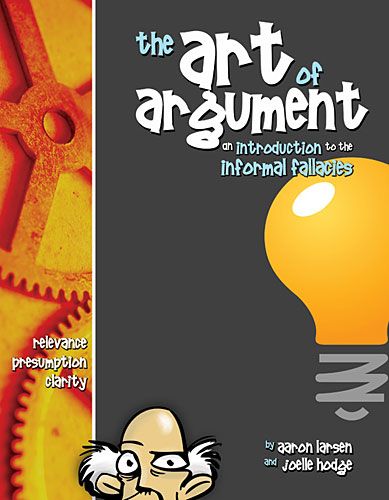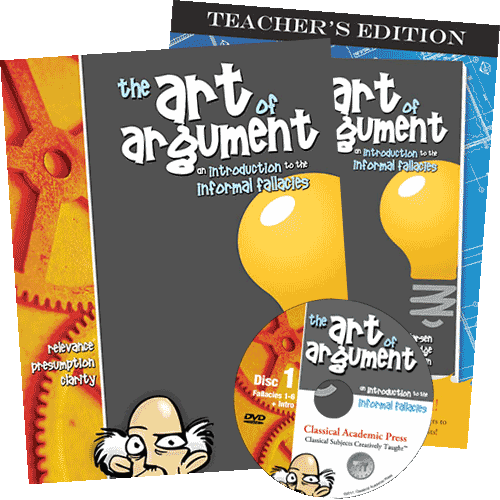I'm not talking about the angry type of quarrelling, however, I'm talking about the type of arguing that folks do when they are having a friendly discussion about a difference that they may have. You know, you look at a glass of water and you think that it is half full but your friend thinks that it is half empty so you have a discussion about it. Unfortunately, some of these "arguments" can turn into fights. But, if you learn "The Art of Argument" well, having discussions with your friends can be a lot of fun.
"The Art of Argument" is what this great course is called that John Allen and I were sent to review by Classical Academic Press. It's one of three courses that this great company publishes that has to do with the subject of "logic". If you know anything about the "classical" approach to homeschooling then you know that logic is one of the key things that they teach - along with a language (usually Latin) and rhetoric. If you are a strict classical educator then most of the other subjects (math, history, science, etc.) fall into place around those three main things. But, this review isn't about the "classical" method of teaching, it's about "The Art of Argument".
I was never taught how to "argue" correctly when I was in school. Remember, I was a child of the 60's and 70's. You know...hippies...peace...love...that sort of thing. I wish I did learn how to argue and debate correctly, and that's one of the reasons that, when we began to homeschool, I wanted John Allen to learn things like Logic and things like Latin. We are strict classicalists (is that what you would call them?) so we don't do things exactly like we should, but I was excited when we were asked to review "The Art of Argument".
"The Art of Argument" mainly talks about "informal fallacies". In fact "an introduction to the informal fallacies" is the subtitle of the course. According to this book, logic has two major subdivisions - formal and informal. Formal logic is this type of thing.
All of the Tinkel men are cute.
My boys are Tinkels
Therefore all of my boys are cute.
Informal logic, however, doesn't talk about those things. It focuses on the fallacies in arguing. I never knew there were fallacies in arguing. I never knew there was a right and wrong way to have a discussion and prove your point. I didn't know that there were sly ways that advertisers an promote their products. Ways that aren't really true or that are really poor ways to prove their point. With a little training to spot these things, you can easily begin to pick out these false ways of advertising, or the false ways that other folks like politicians, use to try to prove their points.
These false ways are called fallacies and "The Art of Argument" talks about 28 of these fallacies. I won't go into explaining all about these 28, but they are divided into three categories that I will briefly explain.
- Fallacies of Relevance - Arguments that are really distractions from the main point.
- Fallacies of Presumption - Arguments that make unwarranted assumptions about either the data or the nature of a reasonable argument.
- Fallacies of Clarity - Arguments that fail because they contain words, phrases, or syntax that distort or cloud their meanings.
When you begin thinking about it and looking at the three above definitions, then you can easily think of two or three commercials (or politicians, or people's views in general) that really don't make sense - there is something a little wrong about what they are saying. They are probably using one of the three fallacies above (knowingly or, perhaps, unknowingly). Wouldn't you like to learn how to better spot these fallacies to better help you choose the right product or politician or learn how to "argue" better with your friend's and point out the fallacies of their arguments?
Well you can learn with this course and it's not boring at all. Although the approach might be classical, there is nothing old, outdated or boring about the way that they teach it. The authors have come up with creative methods like discussions between Socrates and a couple of modern day students or some made up (but very realistic looking) advertisements and a lot of other neat examples. Sprinkled in there are questions for the student to answer in order of him to make sure that he understands what it being taught. At the end of each chapter there are review questions and also a "Cumulative Fallacy Worksheet" that helps students review the fallacies that they have learned in previous chapters.
For those parents who like to keep track of your students progress, there is a Teacher's Edition that is exactly the same as the student edition but has all of the answers filled in. The Teacher's Edition also has Chapter and Unit Tests that you an copy and use with your student and has separate (of course) pages with the answers on them. For those students who would rather listen into a discussion of each fallacy, there is even a set of DVD's with an instructor and four students sitting around a table and having a really interesting discussion about each one.
"The Art of Argument" is perfect for middle school students or for highschoolers that are just beginning to learn about logic (like John Allen).
So, how much does all of this cost? Really not as much as you think. The student edition is $21.95, the teacher's edition is $24.95, and the DVD's are $54.95. There is also a bundle set of all three for $88.95. Just click here or on any one of the hi-lighted links above to get to the Classical Academic Press website to read more about this and all of their products. As usual, some of the other TOS Homeschool Crew members reviewed this and other items from Classical Academic Press. Just click here to get to the Crew blog. Happy Homeschooling!
As a member of the TOS Homeschool Crew I was sent a free copy of The Art of Argument student and teacher's edition along with the first 6 lectures of the DVD series in order to try out and give my honest review on this blog.



No comments:
Post a Comment